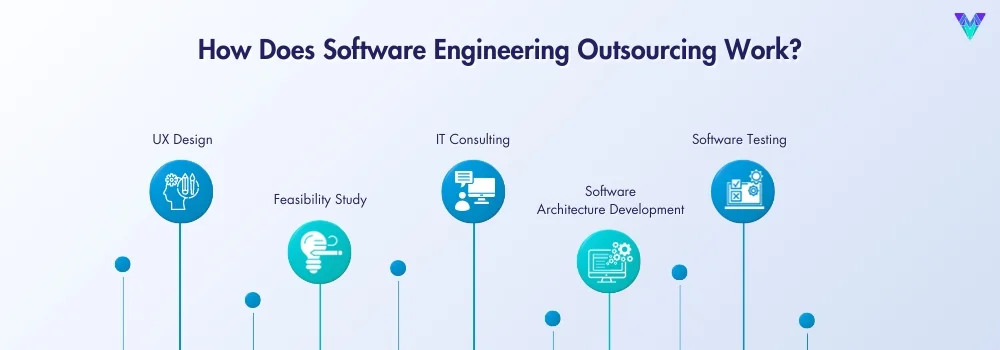No matter if you are a newly launched startup or a well-established enterprise, it is crucial to stay current with the latest technology trends to beat the market competition. According to Statista, the global IT Outsourcing sector is the primary source of revenue in the engineering services market, with a projected revenue of US$430.50bn in 2023. The revenue is anticipated to reach US$587.3bn by 2027, showing it’s the right time for outsourcing software development.
As the demand for outsourcing custom software development continues to rise, companies must carefully evaluate the pros and cons before deciding. This blog will provide you with an in-depth analysis of the pros and cons to help you make informed decisions per your business objectives.
How does software engineering outsourcing work?
Software development outsourcing refers to collaborating with a third-party software development agency to handle all or part of software development needs.

Most common software development outsourcing services
Here are some most common software development services that businesses outsource:
- UX Design: It is a process of designing user interfaces (UI) that are highly interactive and easy to use. The outsourcing company provides businesses with usability consulting, front-end development and other UX design services for TV, PC and mobile devices.
- Feasibility Study: This refers to analyzing if your project is feasible. Outsourcing this process helps businesses save a significant amount of time and money by conducting user testing and establishing proof of concept. Companies use this service to mitigate the risk in the early phase.
- IT Consulting: In this service, the hired software development outsourcing company provides the business with technical advice to optimally implement the tech stack for their custom software development need.
- Software Architecture Development: It refers to designing the complete structure of the software or application. Outsourcing software architecture development helps businesses to achieve well-designed and scalable structures more quickly.
- Software Testing: It refers to finding errors and bugs in the software. Outsourcing software testing ensures a full spectrum of software testing that helps companies get reliable and efficient software at the end of the development cycle.
Balancing in-house vs outsourcing software development can help businesses optimize their resources and stay competitive.
3 different ways to outsource software development
Now, there are mainly three types of software development outsourcing to choose from,
- Onshoring: Businesses choose from outsourcing companies in their city or country.
- Nearshoring: Businesses hire their outsourcing partner from a neighboring country.
- Offshoring: In this type of outsourcing, the businesses hire a software development company located in a distant country.
According to a report by Grand View Research, the global IT services sector is anticipated to reach the milestone of $1070.28 billion by 2025. And the IT outsourcing market accounts for more than 75% of the whole IT services market. What’s more interesting is that software development outsourcing is the most common of all outsourced IT services, with more than 60% of businesses outsourcing all or a part of the software development process to a third-party company.
3 basic software outsourcing models
When it comes to third-party development, there are three basic models to choose from.
- Staff Augmentation: In this model, businesses make an agreement with an outsourcing software development company to provide an additional team to support their existing resources. This model helps companies of all sizes scale their development teams and access a wider talent pool. Here businesses can also eliminate the cost of finding, hiring and training a new workforce.
- Dedicated Team: In this model, the business contracts with an outsourcing services provider company to build a team of developers who will work exclusively on the company’s project. This is the right model if you want to hire developers with specific skill sets and retain developers for future company projects.
- Project-Based: This is a popular option for businesses looking to complete specific projects within a determined timeframe. In this model, a company outsources software development tasks to a Software development outsourcing company that specializes in the required skills and technology. Here, the outsourcing company maintains complete control over decision-making regarding project development while keeping its clients informed through regular updates and progress reports. Project-based outsourcing is the best choice for businesses seeking short-term access to specialized resources.
Outsourcing software development pros and cons
Scaling IT infrastructure requires hiring developers, investing in tech and space and incurring high business costs, especially for smaller firms, but cost isn’t the key driver of software outsourcing anymore. There are many other attractive benefits of outsourcing software development. Let’s read.
| Pros of Software Development Outsourcing | |
| Access to wider talent | Outsourcing allows companies to leverage the expertise of the best minds in the field of software development. |
| More focus on core business | With outsourced software development, businesses can focus on enhancing their core capabilities, grow their in-house employees’ skills, and stay up-to-date with the trends in their niche. |
| Cost-efficiency | outsourcing software development projects allows businesses to potentially reduce the upfront and operational costs of establishing and maintaining an in-house development team. |
| Faster time-to-market | With experienced software developers working on your project, you can expect faster project completion times, which can help expedite the product’s time-to-market. |
| No need for micromanagement | Offshoring allows businesses to focus on core competencies and delegate tasks like decision-making, project management, and progress reporting to their tech partner. |
| Provide Ease in Scalability | Outsourcing is an ideal way to scale up your business’s existing software capacity and access specialized talent without worrying about acquiring the necessary skills and expertise. |
| Leverage the latest technology | Outsourcing to global tech experts helps businesses receive a technologically advanced final product and stay relevant and competitive in their niche |
| Predictable Finances | Outsourcing companies usually prepare monthly, quarterly or annual project cost plans so that businesses can allocate their resources more efficiently. |
| Access to specialized skills | Offshoring enables businesses to tap into developers’ expertise in particular technology domains. |
| Fully protected and Quality development | Outsourcing companies always guarantee the quality and reliability of the products they develop, covering everything from protecting intellectual property to meeting deadlines and associated penalties. |
Given the extensive list of benefits mentioned above, partnering with an outsourcing company appears to be an attractive solution. However, it is essential to understand both the pros and cons of outsourcing associated with the outsourcing process. Otherwise, they can affect your business negatively.
| Cons of Outsourcing Software Development | |
| Risk of Loss of Control | Outsourcing puts the project control in the hands of a remote team, making proper management and communication crucial to avoid business failure. |
| Missing Deadlines | IT solutions provider companies may fall behind schedule or fail to deliver the desired product on time, causing financial damage to businesses. |
| Communication Challenges | Poor communication may result in discrepancies and misunderstandings when dealing with offshore software development outsourcing companies. |
| Unmotivated Team | The outsourced team may lack the same motivation to complete the project compared to the in-house team. |
| Restricted control | Outsourcing through software development companies that use freelancer may lead to communication delays, lack of progress visibility and misaligned expectations between the hiring company and development team. |
| Poor Code and Documentation | The chosen software firm may lack rigorous quality controls, resulting in low-quality code and documentation |
| Unforeseen Expenses | You must read the legal contract carefully to ensure no unexpected fees are incurred during the development. So, pay extra addition to that fine print! |
| Security threat | Outsourcing projects that require access to your company’s data poses a risk to data security. Misuse or passing of that information to unauthorized individuals can harm your business’s reputation in the market. |
Weigh both outsourcing software development pros and cons carefully before you make a final call. Businesses should consider the trade-offs between in-house vs outsourcing software development and choose the option that aligns best with their goals, budget, and competence. In-house teams offer greater control and customization, while outsourcing provides cost savings, scalability, and access to specialized skills.
How to successfully outsource software development?
To successfully outsource your software development project, it is important to take key steps to ensure the best possible outcome. These include:
Here Is a proven 6-step process for Outsourcing your Software Development:
- Decide the project goal. Be specific about what you want to receive at the end of the software development process. Define the features and functionalities that the software should provide.
- Prepare a Scope of Work (SOW) document. This document should cover the exact details of the work in the outsourcing software development project. It aims to communicate project requirements and ensure both parties understand what is expected. A comprehensive SOW is vital for successfully managing outsourcing. It helps ensure timely and budgeted project delivery and that the final product meets the client’s expectations.
- Determine the appropriate technology stack for your project and seek potential outsourcing partners with relevant expertise and experience. Simply put, you must decide what technologies your software development project will need.
- Appoint an experienced software engineering person to track the outsourced project development continuously. Often known as project manager, this person’s role is to ensure that the development is in line with the defined requirement, timeframe and budget.
- Collaborate with the remote development team to avoid any kind of future roadblock. Talk to developers directly regularly for desired deliverables.
- Have realistic expectations. Set multiple milestones and keep tracking progress to provide timely feedback to the chosen outsourcing team to ensure continued progress.
By following these steps, you can ensure that your software development project results in successful outcomes.
6 factors to consider before outsourcing software development
Outsourcing software development is often a strategic decision for many businesses, but it requires careful consideration. Here are 6 factors to keep in mind before outsourcing software development:
Software requirements
To avoid business failure resulting from outsourcing projects, it is crucial to define software development requirements adequately. A clear vision and goal will help your outsourcing partner understand your business needs and recommend the appropriate solution.
Budget
While hiring an outsourcing company, it’s important to look for one that offers services within your decided budget. Rather than choosing based on price alone, prioritize finding a qualified partner who offers a reasonable quote that meets your needs. Calculate the minimum viable product development cost to get a better understanding of potential expenses.
Communication
Effective communication is crucial when outsourcing custom software development services. Establish how you will talk to the remote team of developers before you kickstart your project. Clear communication prevents misunderstandings and ensures that the project meets long-term business goals.
Company culture
Cultural differences can be a major challenge when outsourcing a software project. Thus, it is important to ensure that the values of the outsourcing services provider company align with your own. Understanding their work culture is essential to ensure you find a motivated and successful team.
Tech expertise, resources and portfolio
Ensure the outsourcing company specializes in relevant tools and technology and has well-trained resources with experience in developing software projects similar to yours. Scrutinize their past projects to gauge their technical expertise.
Data Security
When you outsource your software development needs, ensuring the security of your data and business apps is crucial. Ensure the outsourcing company has strong security measures in place and signs a non-disclosure agreement (NDA) to protect your intellectual property (IP). Taking such allows you to maintain peace of mind and focus on your core business activities.
How much does it cost to outsource software development?
The final cost of outsourcing changes dramatically based on many factors, such as,
The geographic location of the company
Software development costs depend on a company’s geographic location affected by competition, availability of skilled labor, and standard of living. Simply put, countries with lower labor costs charge lower software development costs as they have greater availability of skilled labor. Outsourcing software development to India can be a cost-effective way to access a skilled and experienced workforce.
Let’s check out the estimated country-wise rates for software development, as reported by the Clutch.
The experience of the development team
The hourly rate of senior and junior software developers varies on parameters such as years of experience, location and challenges. The more experienced the developers are, the higher they charge. According to a survey conducted by Accelerance, the average hourly cost of hiring a software engineering developer is between $25 and $50 per hour.
The size of the project development
When calculating costs for software outsourcing, size is a critical factor. Projects may be classified as Small, Mid, or Large based on varying software development requirements, including add-on features for mid-sized applications and long project durations for Large-sized projects.
The type of development service needed
Whether you want to build the software from scratch or just need a tiny modification or feature upgrade in the existing app, the cost will change considerably.
The complexity of the project
The more complex your software development project is, the more expensive it will be to outsource it.
Outsourcing your software development project can cost anywhere between $10,000 and $250,000. Outsourcing software development to India can help businesses accelerate their time to market and reduce their overall development costs.
Top 5 software development outsourcing trends
If you are planning to outsource your software development needs, you must stay current with the latest trends in the industry to make an informed business decision. The top 5 software development outsourcing trends in the industry for 2023 to follow.
Cloud Technologies: Demand for cloud-native software dev. is on the rise. Cloud brings benefits such as precise information access and improved connectivity. The global cloud-native software dev. industry expected to reach $168.6 billion by 2025, making it a leading trend.
Agile Development: Agile dev. is widely adopted because it compartments software dev. into iterative cycles, reducing time-to-market. Companies receive user inputs at an early phase to ensure product alignment with customers’ needs. 71% of SD firms utilize agile dev. strategies.
Rise of DevOps: DevOps blends software dev. with IT operations to enhance software delivery, automation and testing resulting in improved productivity. 70% of SE companies use DevOps practice.
Impact of AI and RPA: AI and RPA automate repetitive tasks, improve productivity, and reduce mistakes. RPA streamlines operations with software robots. Outsourcing AI-powered software development can help businesses use advanced technologies without investing in infrastructure.
Value over Price: In the upcoming years, software outsourcing trends will focus on talent-based solutions, emphasizing high-quality services and specialized skills rather than cost savings. Security and compliance remain significant concerns for outsourced software development.
Key takeaways
- IT outsourcing is a growing trend, with the global IT outsourcing market projected to reach $1070.28 billion by 2025.
- There are three ways you can outsource: onshoring, nearshoring, and offshoring.
- There are three basic software outsourcing models: staff augmentation, dedicated team, and project-based.
- Outsourcing custom software development can provide your company with many benefits, such as access to a broader pool of talented resources, reduced development cost, faster time-to-market, and absolutely no need for micromanagement.
- There are also some risks associated with outsourcing software development, such as language barriers, cultural differences, and the security of intellectual property.
- Cloud technology integration in software development has emerged as a prominent trend
- Agile and DevOps Practices are becoming more popular.
Frequently asked questions
It is a process of strategically collaborating with an outsourcing software services provider company to build software for your business.
For successful outsourcing, define your project requirements, research outsourcing companies, select the best fit, sign a contract, communicate regularly, test the software, and deploy it to users.
Companies these days prefer to outsource their software development mainly to achieve highly competitive, top-quality and industry-specific custom products. Outsourcing helps companies reduce the development cost without compromising the quality of the product.
Outsourcing helps companies save time, money and resources. And thus, they can focus more on the core competencies of their business to drive growth and innovation.
Well, it is a right choice for companies with limited technology expertise in-house. However, it is crucial to consider both pros and cons of it before you make a final choice. Spend ample time evaluating outsourcing partners and ensure clear communication of desired outcomes before you begin your project.

Vishal Rajpurohit
Vishal Rajpurohit is a highly accomplished technology entrepreneur with a passion for innovation and excellence.
